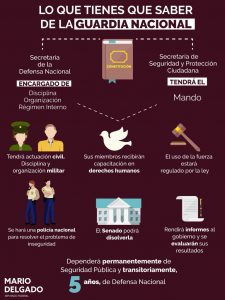
12/24/18 (written by kheinle) — The plan to create a National Guard (Guardia Nacional) in Mexico advanced through the first round of congressional approval. On December 20, 2018, the Chamber of Deputies’ (la Cámara de Diputados) Committee on Constitutional Affairs (la Comisión de Puntos Constitucionales) approved the bill 18 votes in favor to 6 against. If full Congress approves, the National Guard would be a 50,000-person armed force created from the ranks of the Mexican military and police. Mexican President Andrés Manuel López Obrador (AMLO) proposed the force to address the seriously high levels of crime and violence in Mexico.
The bill would require amending 13 articles of the Mexican Constitution, some of which seek to mitigate concerns of human rights and civilian oversight. As Reuters reported, the constitutional changes “would mean that national guard members receive human rights training, are tried by civil courts and will not be able to move detainees to military institutions.” Initially, the National Guard was also going to be overseen by the Secretary of National Defense (Secretaría de la Defensa Nacional, SEDENA). The bill approved in the Chamber of Deputies’ sub-committee, however, moved much of this control to the Secretary of Security and Civilian Protection (Secretaría de Seguridad y Protección Ciudana, SSPC). As the Latin America News Dispatch summarized, “While the unit would still be trained militarily, as was originally proposed, jurisdiction would pass to civilian authorities after five years, according to Representative Mario Delgado.” It continued, “The Senate will also be given the power to dissolve the new guard.”
Critics Speak Up
Despite these changes, critics have widely condemned the proposal. Causa en Común, a collective of more than 500 civil society organizations and businesses, among others, delivered a petition to Congress in November 2018 urging their elected officials to reject AMLO’s proposition. For her part, the director of the organization México Evalúa, Edna Jaime, criticized the National Guard in a November 2018 article titled, “No es más de lo mismo, es algo peor” (“It’s not more of the same; it’s worse”). Mexico’s crime and violence, she wrote, is associated with the dysfunctional State, the void of effective governing mechanisms, and a weak institution. The solution “is improving the capacity of the State” and focusing resources at the local levels, Jaime argued. “World peace is sustainable in local-level processes that operate with good mechanisms of global governance.”

Elected officials also voiced their concern. Mexico City Mayor Claudia Sheinbaum publicly announced that the National Guard would not be needed in the capital. The police are capable of delivering, she said, adding that the federal and local police forces would work closely together. Congresswoman Lucia Rojas also argued that the National Guard would only deepen the military-focused strategy already in Mexico. “And it’s become clear in the last 12 years,” she said, “that there’s absolutely no evidence that having the army on the streets helps to reduce the violence.” The military’s presence in Mexico’s domestic affairs has also led to an increase in the number of human rights violations perpetrated by members of the military against civilians, an issue that Justice in Mexico explored in a 2012 special report.
At the international level, organizations like the United Nations (UN), Amnesty International, and Human Rights Watch have expressed concern, too. Jan Jarab of the UN’s Office on Human Rights in Mexico sent a letter to Congress following the Chamber of Deputies’ sub-committee vote. Approval of the bill, he wrote, “would establish at the constitutional level this paradigm of military involvement in security issues, the same one that has contributed to the deterioration of human rights in Mexico.” Jarab continued, “[It] would threaten the possibility of having a capable civil body in the future that could exercise public security in strict accordance with international human rights standards.”
AMLO is not the first Mexican president to pursue the idea of a National Guard. His predecessor, President Enrique Peña Nieto (2012-2018), initially called for a 40,000-person force that was eventually scaled down to 5,000. AMLO’s current bill will soon be presented to the full Chamber of Deputies for consideration.
Sources:
June S. Beittel, “Mexico: Organized Crime and Drug Trafficking Organizations,” Congressional Research Service, July 3, 2018.
“Mexican president-elect’s party presents national guard plan.” Reuters. November 20, 2018.
“Diputados de México aprueban en comisiones la nueva Guardia Nacional.” RT. December 21, 2018.




